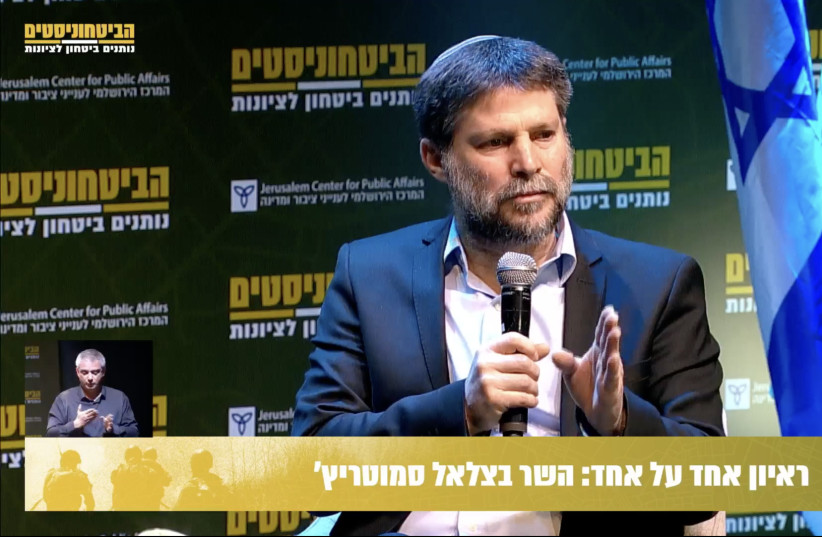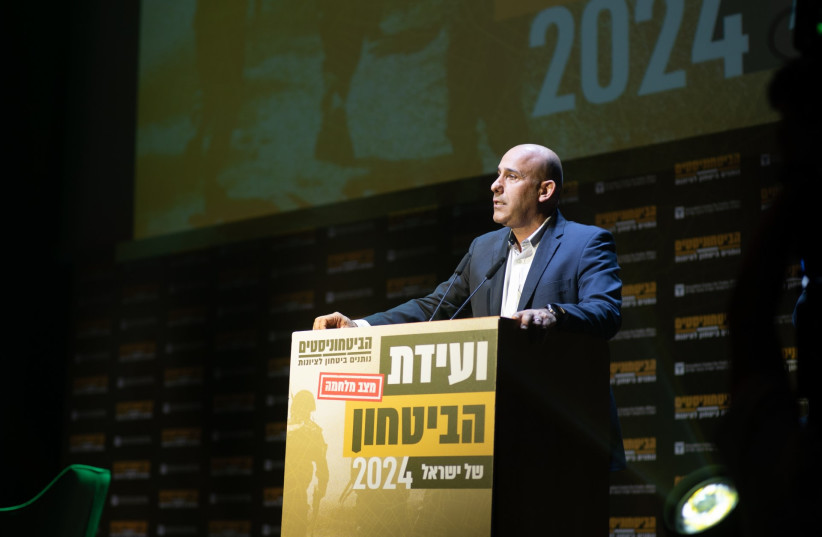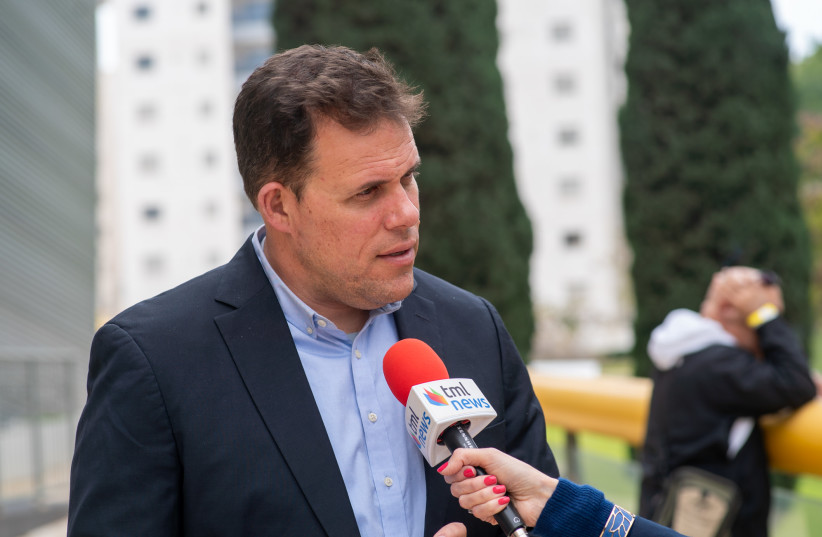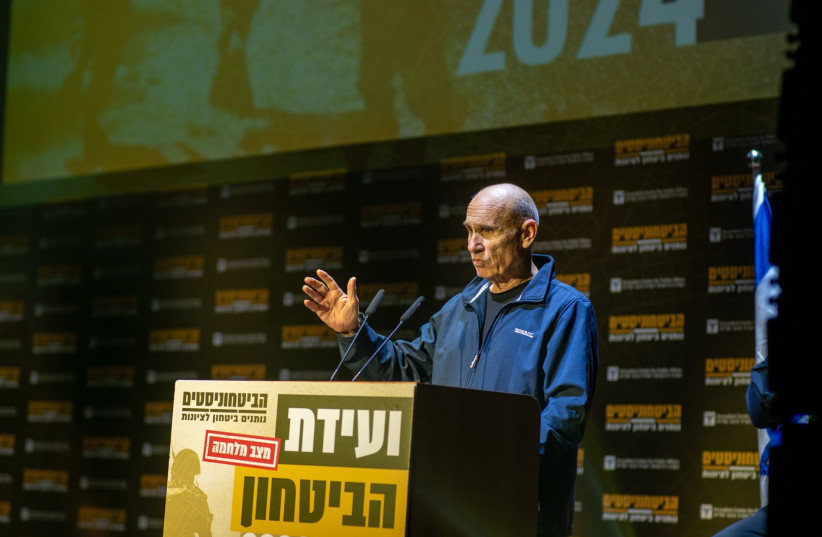As the Israel-Hamas war continues for its fourth month, dozens of Israel’s top military thinkers gathered to discuss the next steps in the war as well as the days after its inevitable end.
For more stories from The Media Line go to themedialine.org
Sponsored by the Israel Defense and Security Forum, a group of some 16,000 reserve officers and operatives from Israel's security forces focused on the country's security needs, the conference was held in the southern Israeli city of Ashkelon, from where residents were evacuated in October following heavy Hamas rocket fire.
Among the key concerns discussed at the conference were: Iran, Qatar, and other sources of funding for Hamas; the expansion of the war to new fronts, especially against Hezbollah in Lebanon and the Houthis in Yemen; Hamas’ infiltration into UNRWA, the United Nations Relief and Works Agency; who will control Gaza after the conflict, and Western pressures to establish a Palestinian state despite the current hostilities.
The conference leaned heavily towards hawkish and right-wing participants, including far-right Finance Minister Bezalel Smotrich, who gave a one-on-one interview there. Prime Minister Benjamin Netanyahu sent a short pre-recorded speech. Former Knesset member Ruth Wasserman Lande of the center-right Blue and White party also attended.
Speakers largely agreed on the end goals for the war: the defeat of Hamas, the dismantling of UNRWA, the external interim control of Gaza, and other issues.
However, they differed in their approaches. Some agreed with the concept of an international coalition overseeing administrative control of Gaza’s rehabilitation and restructuring, while others, such as Smotrich, argued that “either Israel will control Gaza, or Hamas will.”
UNRWA and humanitarian aid must no longer be in the hands of Hamas
Smotrich said this extended even to the dissemination of humanitarian aid.

“The humanitarian aid is needed, but it’s managed awfully,” Smotrich said in his interview. “The world wouldn’t let us starve 2.2 million Gazans, and we don’t want to do that either. But we can’t let UNRWA manage the aid, because UNRWA is Hamas and gives aid where it wants to. … Therefore, Israel must control humanitarian aid. Aid must be given only in the safe zones that we define, and directly to the civilian populations. … Hamas must be made to starve in their tunnels like rats.”
Rhetoric on the dismantling of UNRWA was unanimous at the convention.
Speaking on a panel on the future of Gaza, Wasserman Lande strongly criticized UNRWA.
"UNRWA? UNRWA is the problem. UNRWA must be dissolved as a first step," she said. She added that the agency's school system should be replaced immediately by an international educational network run by the US, UK, and Germany, "which will teach everything from scratch."
Israeli attorney, human rights activist, and founder of the Shurat Hadin-Israel Law Center Nitsana Darshan-Leitner told The Media Line that she intends to make UNRWA’s dissolution a reality through a variety of means.
“First, we are going to sue UNRWA,” Darshan-Leitner said. “UNRWA has turned out to be the executive arm of Hamas. In every UNRWA facility, there are rockets and tunnels.”
In addition, UNRWA teachers and staff have been repeatedly exposed as having participated in or supported the Oct. 7 attacks.
“The victims of Hamas’ Oct. 7 attacks, and the victims of Hamas throughout the years, can bring a lawsuit against UNRWA to block them from operating,” Darshan-Leitner said.
“The other avenue [against UNRWA] will be an injunction against the US government, which is a main funder of UNRWA. Since UNRWA is a terror organization, the US cannot finance them.”
Other points of discussion were whether and when to withdraw Israeli forces at the end of the war, whether and when to allow Palestinians back into certain parts of the Gaza Strip, and whether Israel or some other coalition or entity should maintain control of the Gaza Strip for the foreseeable future.
The complete dismantling of Hamas will extend beyond the war
IDF Brig. Gen. (res.) Amir Avivi, who is also the forum's co-founder and chairman, told The Media Line that while the first phase of the war, the dismantling of Hamas’ military, is winding down, “we have to understand that there will still be military scattered in different places and that it can take a year or two or even more to dismantle this huge infrastructure. … Maybe it will never end. And in addition, we’ll need to have two things: full control of the Egyptian-Gaza border to prevent the endless flow of weapons, and full freedom of operation in Gaza from now and pretty much forever.”

The question of a cease-fire in return for the release of the hostages was not discussed at the conference. To the contrary: The panelists and guests all agreed that keeping up the pressure on Hamas is the only way to extract the hostages, dead or alive.
During his interview, Smotrich said that it would be cruel and disingenuous to promise the return of all the hostages.
“All we can promise is that we’ll try,” he said. He added that Hamas’ intention “was not to keep the hostages or survive as a regime. The purpose is to divide Israeli society. And usually, our solidarity is our strength. But at the moment, this is our weakness.”
Smotrich and others said that if Hamas succeeds in dividing Israel over the hostage issue, that would only bring further disaster. He said it would place a crosshair on the back of every Jew and Israeli around the world as a target for kidnapping in the future.
IDF international spokesman Lt. Col. (res.) Jonathan Conricus told The Media Line that the consequences of failing to present a united front would be more dire and immediate, because “all of the terrorist organizations around us are watching and assessing our every step.”

“If Hezbollah in Lebanon, and if Iranian proxies in Syria and other terror organizations in the Middle East, see that Hamas did the most violent attack against Israeli civilians, took 240 Israelis hostage, and murdered, and pillaged, and butchered, and raped, and executed, and then got away with it to live and see another day … I think that would be a terrible message for the State of Israel to send to such a violent environment,” Conricus said.
“The message needs to be that if you have the audacity and the cruelty to do this to Israeli civilians, your fate will be violent and it will be short and you will be killed by the end of that process. You will be dead.”
The participants also unanimously disagreed with the popular concept of the conflict as a war between Israel and Hamas or the Palestinians, instead saying that it is a war between the West and the Iran-Russia-China bloc that is being played out by Israel and Hamas.
“This war does not have an end-state,” Maj. Gen. Gershon Hacohen, one of the forum's founders, told the audience.
“We are fighting an Islamic worldview with a different way of thinking. It has different dreams that cannot be negotiated away. The way they see it, is that if they can’t win today, they’ll wait patiently for tomorrow.”

Dr. Dan Diker, president of the Jerusalem Center for Public Affairs, told The Media Line: “This is the second Iranian regime vs. Israel war. The first was in 2006 when the Iranian terror proxy Hezbollah attacked Israel and kidnapped Israeli soldiers, and Israel followed suit by launching a major counter-terror operation in Lebanon.”
The current war is an extension of Israel's main war with the Iranian regime
Diker said that the reason the West does not understand the broader strokes of the war is that it has been driven by a long and successful Iranian-backed deception campaign.
It is "the same type of perception campaign that the Nazi regime advanced against the West, and which the Soviets also advanced against the West,” he said.
“Part of the campaign is to convince the West that this is a territorial conflict between the Israelis and the Palestinians. This couldn’t be further from the truth. It’s an existential, religious, and ideological conflict from the point of view of the Iranians. They’ve said it time and time again, and so has Hamas. The West has been deceiving itself in thinking this is a simple and solvable conflict.”
Hacohen said that when the world speaks about creating a Palestinian state and a new regional order in the current geopolitical climate, most people, including world leaders, do not understand what that means.
“We must bring to public awareness that a Palestinian state, such as the Biden Administration and other world leaders are currently talking about, is a disaster for Israel,” Hacohen said. “Israel cannot exist with any further withdrawals. Any withdrawal would turn [Hamas leader] Yahya Sinwar into Saladin-times-2.” He was referring to the 12th-century Muslim conqueror who captured Jerusalem from the Crusaders and re-established Muslim dominance in the Middle East.
Some speakers said there was light at the end of the tunnel, especially now that UNRWA has had its funding frozen by the US, Canada, UK, and other countries that provide the bulk of the agency's funds.
“The future of the Middle East for security, stability and prosperity is rooted in the success of the Abraham Accords and beyond," Diker told The Media Line, referring to the 2020 normalization agreements signed between Israel, the UAE, Bahrain and Morocco.
He said the Arab countries “see Israel as a family member in the Arab Muslim-majority Middle East,” and that they “want a pathway towards normalization," but that Israel must first “defeat Hamas and its Iranian taskmasters completely.”
“They are demanding a total Israeli victory, and that message somehow has not filtered to the Western discourse,” he said.
